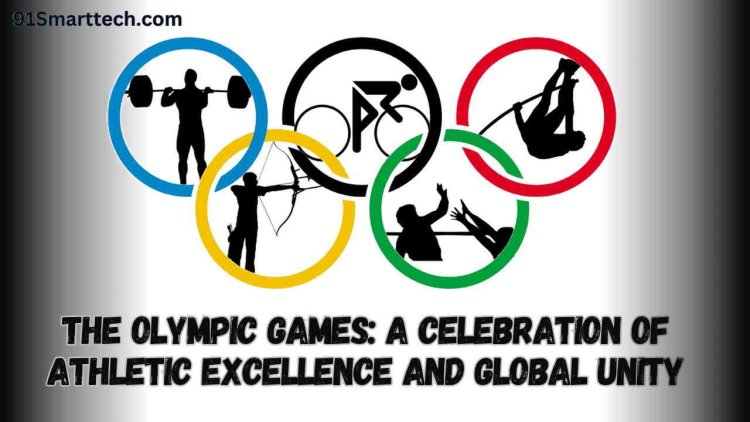The Olympic Games: A Celebration of Athletic Excellence and Global Unity
The Olympic Games, a pinnacle of athletic prowess and international camaraderie, have captivated audiences for over a century.

The Olympic Games, a pinnacle of athletic prowess and international camaraderie, have captivated audiences for over a century. From their ancient origins in Greece to the modern-day spectacles that unite billions, the Olympics symbolize the epitome of human spirit and achievement.
The Historical Legacy of the Olympic Games
The roots of the Olympic Games can be traced back to ancient Greece, where they were held in Olympia as early as 776 BC. These early Games were deeply intertwined with religious festivals in honor of Zeus and served as a unifying event for the various Greek city-states. Athletes competed in various events, including foot races, wrestling, and chariot racing, with the victors being celebrated as heroes.
Pierre de Coubertin, a French educator and historian, is credited with bringing the Olympic Games back into the contemporary day. The first modern Olympic Games took place in Athens, Greece, in 1896, with 241 competitors representing 14 countries. This event signaled the start of a new age, with the Olympic Games expanding to become the world's largest and most prestigious sporting event.
Also Read: The Most Popular Online Games: A Comprehensive Guide by...
The Structure and Organization of the Olympic Games
The International Olympic Committee (IOC), established in 1894, oversees the organization and operation of the Olympic Games. The IOC is responsible for selecting the host city, coordinating with international sports federations, and ensuring that the Games uphold the principles of the Olympic Charter.
The Olympic Games are divided into two main categories: the Summer and Winter Games, held every four years in alternating even years. Each edition of the Games features a unique blend of traditional and new sports, reflecting the evolving interests and talents of athletes worldwide.
Summer Olympics: A Showcase of Diversity
The Summer Olympic Games feature various sports, from athletics and swimming to gymnastics and basketball. These Games highlight the versatility and endurance of athletes, with events that test speed, strength, and precision. Iconic moments, such as Usain Bolt's record-breaking sprints and Michael Phelps' historic medal haul, have cemented the Summer Olympics' reputation as a platform for extraordinary achievements.
Winter Olympics: Mastery of Snow and Ice
The Winter Olympic Games celebrate sports performed on snow and ice, including skiing, figure skating, and ice hockey. The Winter Games showcase athletes' ability to navigate challenging conditions and perform intricate maneuvers with grace and power. Legendary performances, like those of figure skater Yuzuru Hanyu and skier Lindsey Vonn, exemplify the exceptional talent and dedication required to excel in these sports.
Also Read India vs. Ireland, 2nd T20I: Who said what following the...
The Impact of the Olympic Games on Global Society
The Olympic Games transcend mere athletic competition, playing a significant role in promoting global unity, cultural exchange, and social progress. The Games provide a stage for athletes from diverse backgrounds to share their stories and inspire future generations.
Promoting Peace and Understanding
One of the core missions of the Olympic Games is to foster peace and understanding among nations. By bringing together athletes from around the world, the Games create opportunities for dialogue and collaboration, breaking down cultural barriers and fostering mutual respect.
Economic and Social Benefits for Host Cities
Hosting the Olympic Games can have profound economic and social impacts on the host city and country. The influx of tourists, investment in infrastructure, and global media attention can stimulate economic growth and development. Cities like Barcelona and Beijing have leveraged the Olympics to transform their urban landscapes and enhance their international profiles.
Advancing Gender Equality and Inclusion
The Olympic Games have also been a catalyst for advancing gender equality and inclusion in sports. Over the years, the IOC has made significant strides in promoting female participation and ensuring that the Games are accessible to athletes of all abilities. The inclusion of events like women's boxing and the Paralympic Games underscores the commitment to creating an inclusive and diverse sporting environment.
Challenges and Controversies
Despite its many triumphs, the Olympic Games have not been without challenges and controversies. Issues such as doping, political boycotts, and concerns over the environmental and social impact of hosting the Games have prompted ongoing debate and reform.
Combatting Doping and Ensuring Fair Play
Doping remains a significant challenge for the Olympic movement. The IOC and the World Anti-Doping Agency (WADA) have implemented stringent testing protocols and penalties to uphold the integrity of the Games. High-profile cases, such as those involving athletes like Ben Johnson and Lance Armstrong, highlight the ongoing battle to ensure fair competition.
Navigating Political Tensions
The Olympic Games have often been influenced by geopolitical dynamics. Boycotts, such as those during the 1980 Moscow and 1984 Los Angeles Games, have underscored the intersection of sports and politics. The IOC continues to navigate these complexities, striving to maintain the Olympic spirit of neutrality and peace.
Sustainability and Environmental Concerns
The environmental impact of hosting the Olympic Games has come under increased scrutiny. The construction of venues, the influx of visitors, and the associated carbon footprint pose significant challenges. Recent host cities have made concerted efforts to prioritize sustainability, with initiatives aimed at reducing waste, promoting renewable energy, and ensuring the long-term viability of Olympic infrastructure.
The Future of the Olympic Games
As the Olympic Games continue to evolve, they face both opportunities and challenges. The introduction of new sports, such as skateboarding and surfing, reflects the IOC's efforts to engage younger audiences and stay relevant in a rapidly changing world.
Embracing Innovation and Technology
The integration of technology into the Olympic Games is transforming the way we experience and engage with the event. From virtual reality broadcasts to advanced data analytics, technology is enhancing the fan experience and providing athletes with new tools to optimize their performance.
Fostering Greater Accessibility and Participation
The IOC is committed to making the Olympic Games more accessible to a global audience. Initiatives such as the Olympic Channel, which provides year-round coverage of Olympic sports, and efforts to promote grassroots participation, aim to inspire and engage people from all walks of life.
Championing Sustainability and Legacy
Sustainability and legacy will remain central themes for future Olympic Games. Host cities are increasingly focused on creating lasting benefits for their communities, ensuring that the Games leave a positive and enduring impact. The Tokyo 2020 Olympics, for example, emphasized the use of recycled materials and renewable energy, setting new standards for sustainable event management.
Conclusion
The Olympic Games demonstrate the ability of sport to unite, inspire, and enhance humanity. The Olympics represent the ideals of achievement, friendship, and respect, both historically and today. As we look to the future, the Games will evolve to represent the dynamic and diverse world we live in. Whether via magnificent sporting achievements, moments of profound human connection, or advances in sustainability and technology, the Olympic Games will continue to be a light of hope and a celebration of the best of what we can do together.


 Mike2051
Mike2051 








